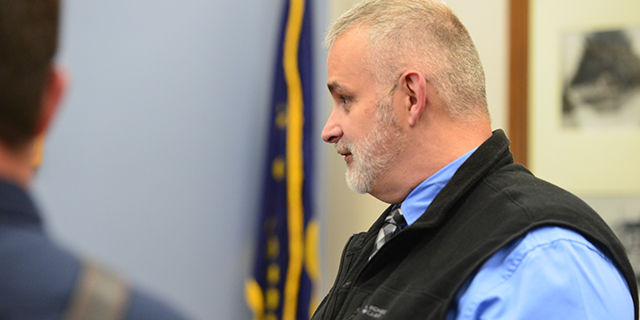MONK VISITS, TEACHES MEDITATION IN SUMMERVILLE
Published 12:00 am Saturday, June 4, 2005

- TRANQUILITY IN SIMPLICITY: Though Subhuti Shibuya graciously donned the traditional orange robe of the Buddhist monk for photos, he prefers to dress as a simple teacher while visiting at the invitation of Carole Novitske to guide her in the practice of meditation. (Observer photos/MARDI FORD).
He is probably just about the last person one would ever expect to meet in rural Union County.
Trending
His name is Subhuti Shibuya a 73-year-old Buddhist monk who has traveled all the way from Japan via a monastery in Los Angeles to a small cabin in the forests of Eastern Oregon.
His host in Summerville is Carole Novitske she refers to him as "Sensei," which means "teacher" in Japan.
Novitske met Sensei through a mutual friend. A student of the practice of meditation, Novitske asked Sensei to come stay in a small, unused cabin on her property and teach her.
Trending
Novitske’s practice of meditation was sporadic before he came to stay. Now, she says, he has helped her remain focused and her discipline is improving daily.
"He teaches mostly by example," she says.
Though Sensei is content to spend the majority of his waking time in the physical and mental discipline of meditation before the simple altar in his cabin, he does get outside a bit. He enjoys the quiet peaceful setting, has learned to feed her horses though their size alone intimidates him and even chops a little wood.
"My total life is very simple just straight ahead. I wake up in the morning and I have no money, no food, no job. I would be depressed if I thought about it commit suicide. But I get out of bed. I meditate. Then I am content," Sensei says.
Though his words are sad and his tone accepting, Sensei’s smile is joyful and genuine.
Born to a wealthy Japanese family, Sensei was educated at a Christian missionary university in Tokyo.
Although he read the Holy Bible, Sensei says, "I never found God there. I looked, but I did not see His face."
It was his exposure to "Ulysses" by Irish novelist and poet James Joyce that planted a seed of fascination with the concept of a stream-of-consciousness the "unbroken flow of perceptions, thoughts and feelings in the waking mind."
This interest led him to a deeper devotion to meditation and an experience that would change his life forever.
Sensei chose to study with a Zen master at a Buddhist monastery in Japan. After hours spent folded into the Lotus position, emptying his mind, trying to stay focused in the moment, Sensei says he was in great pain.
Then, halfway through the experience, the pain suddenly left his body and the mental and physical sensations he experienced were a breakthrough.
"I thought, ‘This is my real life.’ It was at that moment when I got my real life," he repeats. "Since then, I just kept meditating. The pain and discomfort it did not bother me from that time."
He traveled to Bodhgaya, a vital Buddhist center and pilgrimage site in India, to study and to teach meditation in the stricter sense originally taught by Buddha. When he returned to Japan, Sensei became an Abbot in a Buddhist monastery, but eventually became unhappy there.
"These monks were very rich, not devoted to practice. Wearing fancy costumes, eating and drinking too much corruption, too much decadence." Sensei shakes his head in disgust.
"In Japan there is no air. No free air fresh air. There is no room," he says.
Sensei’s words speak of the lack of quiet and space he thought he might find in America. After a visit to a temple in Los Angeles in the late 1980s, he decided to stay here and teach.
He loves American baseball and freedom. He deplores our stress and corruption. He does not understand our preoccupation with the sanctity of a life that has no purpose.
For a Buddhist, there is no afterlife. There is only what is now. Death with dignity, Sensei says, is its own purpose. That philosophy makes experiencing each moment very important.
"When you are doing something, don’t worry about what comes next. Focus on what you are doing be aware of that moment," he explains.
When slicing fruit, for example, Sensei says do not think about how it will taste when you will eat it. Think about your hand on the knife, slicing through the fruit.
Children, he says, provide some of the best examples of living in the moment.
"All kids are happy. All flowers are beautiful. Everything is so full of joy, full of life."
American parents, he says, should allow their children to be children and live in the moment for as long they can.
Mardi Ford








